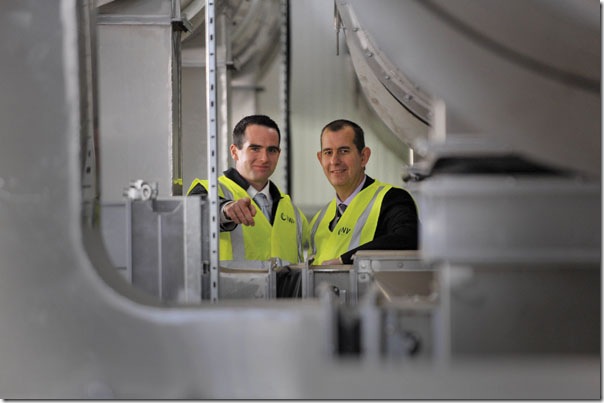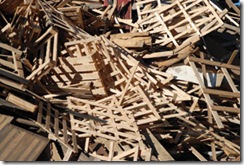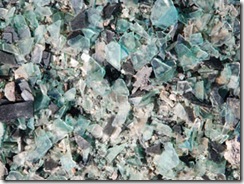A better future in waste
Environment Minister Edwin Poots outlines his preferred way forward on waste to Peter Cheney and explains his confidence that the province will meet its demanding targets and get most of the way to zero waste status.
The scale of Northern Ireland’s waste output, alongside the potential financial penalties, automatically explains why it is a high priority for the Environment Minister.
“Waste is a priority because we’re producing a million tonnes of [council collected waste] every year and obviously there’s an environmental problem that is created if you don’t manage that correctly,” he states.
“We have a number of EU Directives which we need to subscribe to and ensure that we meet, and we also have our own landfill taxes going up to £72 [per tonne] per annum.” Landfill tax is currently £40 per tonne and is expected to rise to £72 by April 2013. He adds that a £72 million burden would be a “waste of public money, particularly when we can make better use of waste through recycling and through energy recovery.”
Finding a better way of dealing with waste is both “more environmentally friendly and more financially advantageous” to the public, and it also creates significant business opportunities. In contrast, throwing rubbish in the bin, taking it to landfill and forgetting about it is now “a thing of the past” as “what was regarded as waste” can be treated differently.
The DoE’s Waste Management Strategy for 2006-2020 was published under direct rule by Lord Rooker in March 2006. Progress has continued under devolution with household recycling rates rising by 6 per cent and the corresponding municipal rate by 7 per cent over three years. Both are now above 30 per cent and on target to reach the aim of recycling 50 per cent of waste by 2020.
That target is a considerable aim but nonetheless achievable, in Poots’ view. Overall, waste has already been reduced by 64,000 tonnes over one year, which represents part of the “clear evidence that there’s been considerable success since devolution.”
Increasingly, his department’s focus is on managing food waste, which accounts for around 25 per cent of land-filled waste, and he believes “considerable progress” will be made over the next year to two years. Food waste also produces the greenhouse gas methane as it decomposes, thus making it “quite critical” to tackle.
Awareness
The Minister has already alluded to public awareness about waste and its impact being lower than it needs to be. Local authorities and the waste industry tend to be well aware of the consequences as they see them first hand.
Asked how he hoped to raise awareness, he pointed out that DoE publicity campaigns have already had a good impact, driving up recycling from 5 to 32 per cent over the last seven years. He sees the education process as “absolutely critical” and therefore it must be continued.
“We’re pushing very hard in terms of the amount of packaging that’s coming from business,” he says. In addition, as young people learn the importance of recycling, this will make recycling easier.
“As young people start their own homes, many of them are coming in to their own homes with the whole concept of recycling very clearly set in their minds whereas for others there was a change process [that] had to take place. So as we move further into this, it will get easier to recycle because that’s what people think about. People actually recognise that recycling is a way of life now and they actually respond to it.”
Poots has commented that the new world that emerges after the current recession will not be the same as the old one. “Rampant consumerism, without reference to the impact that this has on ourselves and the environment is a thing of the past,” he said in remarks prepared for agendaNi’s waste infrastructure conference in October. “The new, post credit crunch, world will be much more sensitive to the finite nature of the Earth’s natural resources and this will be reflected in the economy.”
With less construction activity, builders are producing less waste. Likewise the amount of packaging waste from retailers has generally gone down, due to less shopping, although Northern Ireland is “bucking the trend” as it is attracting more southern shoppers than before. He does not, though, see the recession’s impact as a solution in itself.
“That is not tackling the problem because as the economy starts to grow again that problem would rise again. We can’t settle on our laurels because you get better waste figures over a couple years whenever the economy is in recession,” he notes.
“The work needs to continue to develop the recycling processes, to reduce the amount of waste that is produced in the first instance and to put in the capital infrastructure to deal with those wastes that can’t be recycled.”
Technology
Energy recovery is the way forward for dealing with unrecyclable waste, he maintains. The North West Region Waste Management Group and Southern Waste Management Partnership have opted for pyrolysis, which breaks down material and produces gas, coke and tar. The arc21 group, covering the greater Belfast area, has meanwhile chosen energy-from waste through incineration.
Incineration sceptics have pointed out that such a plant would need a guaranteed stream of waste to keep it viable but he does not see this as the problem. With the current amount of waste the province produces, it would not achieve the point where energy recovery is not needed, he contends.
Other groups are looking at other systems and each method will be assessed before a decision is made but, in his view, it is impossible to meet the requirements any other way.
“All of those projects need to proceed because we cannot meet our targets unless there is energy recovery,” Poots states. As for individuals who say that waste should either be reduced or recycled, he describes their view as “cloud cuckoo land”.
Scotland, by comparison, ultimately aims to use up to 25 per cent of its waste for energy production; 70 cent would be recycled with a maximum 5 per cent going to landfill.
While these are high targets, he sees them as “probably achievable” and Northern Ireland will aim to achieve similar rates.
The province can therefore “more than achieve” its EU targets. Taking the 50 per cent recycling aim as an example, he points to Banbridge and Antrim almost reaching that with their current performance. Some councils, such as Belfast and Strabane, are closer to 20 per cent so “there’s a fair bit of catch-up to take place” in those areas.
“Obviously if Banbridge and Antrim councils are currently at that point, there shouldn’t be any problem whatsoever for other councils achieving that over a 10- year period,” he surmises.
Single model
Poots is also keen to set up a single waste disposal authority for Northern Ireland, which would replace the existing waste management groups. He has also backed the groups’ existing work and said that their procurement processes will not be put at risk by any organisational changes.
“It’s something that needs to be very closely linked to local government,” he explains. “Local government are the main managers of waste so whatever they do is going to affect how you ultimately deal with it in conclusion.”
For a start, a single authority should drive down costs and then better promote recycled products in the market. It would also be a more powerful organisation in the tendering process and require fewer administrative staff.
“In all of those respects, there are significant savings to be made for the general public as a result of introducing a single waste disposal authority. Ultimately, that’s what we as public representatives have to do, to drive efficiencies in government where it becomes a much more efficient machine than it currently is and therefore [in] the services that you deliver for the public … you can invest more of a limited resource into what the public want. And that’s front-line services, not administrative corporate services.”
No shortage of ideas
He has seen “quite a number” of best practice examples around the province. Banbridge council has set up a shop which sells second hand white goods. Belfast has organised weekly collections of food waste from terraced houses, which “should really move their figures ahead quite rapidly”. Castlereagh council’s kerbside boxes for mixed dry recyclables, provided by the social enterprise Bryson Group, have also been very successful.
“The food waste is an area where there’s a lot of good opportunities,” he continues. Some organisations work with supermarkets to take foods which are coming to the end of their shelf life, which can then be provided to people who are less well off. The Salvation Army is one example.
“There’s actually no shortage of ideas and there’s no shortage of businesses who now see waste as a great opportunity, and who are tapping into the opportunities that exist arising from it.”
Zero?
A draft Waste Bill went out for consultation between April and June this year, to update the law on managing landfill and contaminated land, and provide for a single waste disposal authority. Poots hopes to bring this before the Assembly in January and have it passed before the 2010 summer recess.
Separately, Environment Secretary Hilary Benn has set out a path to make the UK a ‘zero waste nation’. Asked if Northern Ireland can achieve that, he replies: “I don’t think it can become zero waste but I think that it can move to probably 90 per cent, potentially 90 per cent plus, of [a] reduction of waste that’s going to landfill.”
Compared to the amount of waste which was being sent to landfill 10 years ago, he expects that less than 10 per cent of that amount would be land-filled in future.
“That’s something that will not happen overnight,” he says in conclusion. “It will not happen without investment. It will not happen without the right infrastructure in place. And it will not happen without the support of either the public or local government, but I think we have the support of the public, we have the support of local government and we have the will at central government to make the investment in the waste infrastructure. So in all of that, that is achievable in due course.”









